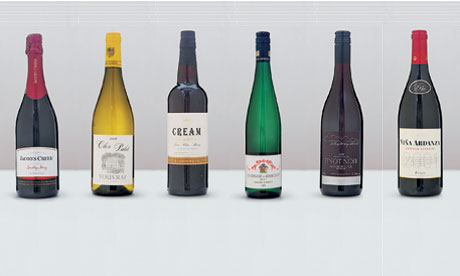
The practice, or "art" as some would have it, of matching food and wine is surprisingly divisive. Some of the most ardent lovers of food and wine that I know (restaurateurs and winemakers among them) will have nothing to do with it, seeing it as a blend of quackery and the kind of rule-based snobbery that makes people fret about fish knives and the correct motion of their soup spoon. For these sceptics, the voluminous literature on the subject amounts to nothing more than a prolix reply to a simple question: "What will I drink with dinner tonight?"
Others, as that voluminous literature attests, believe food and wine matching is the gastronomic grail, a complex but rewarding subject worthy of extended study that will lead to new heights of aesthetic refinement.
I'm somewhere in the middle. I find it hard not to raise a quizzical eyebrow when I hear about the initiatives of the avant garde such as champagne house GH Mumm's quest to find the perfect dishes to match with its (very good) non-vintage champagne, where "gas chromatography, solid phase micro-extraction and mass spectrometry" were all brought to bear on this most urgent of questions.
I'm also no fan of the more conservative side, the kind that deals in "oughts" and "shoulds", and which implies there is something very non-U about drinking claret with Dover sole or Chablis with roast beef, as if life was one joyless dinner party.
Despite my reservations, I can't throw in my lot with the sceptics for the simple reason that most wines really do taste better when served with a food that complements them, or at least does not chafe against them, and vice versa. Provided it's treated as fun rather than as a quasi-academic quest, matching food and wine is a harmless way of adding to a meal.
But just as I tend not to sprinkle parmesan on rogan josh or serve olives with ice cream, there are certain rules of thumb when choosing wines for food. Most involve a basic awareness of the structure of the dish, and picking wines that share the same attributes. High acid dishes based on tomato or with a citrus component prefer high acid wines, for example, while sweet foods are happiest with sweet wines and a powerful rich meat stew or barbecued meat requires a wine of similar power and concentration. Sweetness in wine works well, too, for spicy foods, in this case acting as a cushion and counterpoint for the heat in the same way as palm sugar balances the chilli in Thai cuisine.
Common sense also has a role to play. If a dish has a strongly flavoured sauce, it makes sense to pick a wine to go with that rather than the slab of protein (whether meat or fish) it's served with. And it's also worth accepting that some foods (strong vinaigrette dressings and dark chocolate) are just too overwhelmingly powerful to go with anything.
The best advice I can offer takes the form of a snappy adage: what grows together, goes together. Most European wine styles have grown up hand in hand with the local food culture. Combinations such as oysters and Muscadet or Tuscan rabbit stew with Chianti are proven over centuries. Which makes them the best place to start if you're looking for something to drink with dinner tonight.
Six great food and wine matches
Meaty curries: Jacob's Creek Sparkling Shiraz NV, Australia (£9.49, Waitrose Wine Direct
Sparkling shiraz, of which this is one of the best examples, is very much a Marmite kind of wine, but it's the best style I've tried yet for an otherwise tricky match. It's got tannin that bonds satisfyingly with the fat of the red meat, it's got sweetness to work with the spice, and the fizz washes it all down cleanly.
Vietnamese or Thai: Clos Palet Vouvray, France 2009 (£7.35, Morrisons)
Something in the slightly tart, fresh, green, appley flavours of this off-dry Loire white works well with the the kind of herbs – coriander, mint, Thai basil – used in Vietnamese and Thai salads and noodle dishes. The touch of sugar, meanwhile, means it can deal with any chilli heat.
Sushi: Reichsgraf von Kesselstatt Riesling Kabinett, Mosel, Germany 2009 (£9.99, The Co-operative)
Sushi is another difficult match, calling for a wine that will not overwhelm the subtle texture and flavour of the fish, but which is also comfortable with the heat of wasabi and the mild vinegar tang in the rice. This zingy off-dry white's mix of delicacy and subtle lemony power performs all three functions very well.
Vanilla desserts: Waitrose Cream Sherry, Jerez, Spain (£6.49, Waitrose)
Consumed on its own, this great value sherry is all dried fruit and nuts and hedonistic richness. Serving it with a vanilla dessert or ice cream, therefore, has a similar overall effect to pouring custard on a slice of fruit cake or Spotted Dick with a slight alcoholic kick. Deliciously comforting.
Grilled salmon: Asda Extra Special New Zealand Pinot Noir 2009 (£10.18, selected Asda)
Lighter, less tannic styles such as beaujolais or, in this case, pinot noir, are the prefect riposte to anyone who still believes red wines can't be served with fish. With just a few minutes in the fridge, the soft red fruit flavours here act like a condiment for a meaty fish such as salmon, which can overwhelm some whites.
Roast lamb: La Rioja Alta Viña Ardanza Reserva Especial, Spain 2001 (£19, The Wine Society)
This classic, traditional match is all about harmony. The wine here is rioja at its most wonderfully smooth, supple and strawberry-scented, with a certain mellow quality that accentuates the tenderness of perfectly cooked, pink-centred, roast lamb, but with plenty of supporting acidity to cut through the fat.

